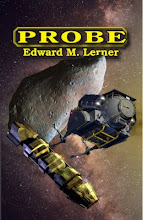| Look, Ma, no hands! |
For example, suppose that a deer just darted in front of my car. Do I purposefully endanger myself by ramming the deer? Or do I veer, and in the process endanger pedestrians or other drivers? For a machine to make such judgment calls -- on a case-by case basis, in the split-second during which such decisions must be made -- would seem to require mastering general (aka, human equivalent) AI. See: "Why self-driving cars remain more science fiction than future."
Sorry if that was a downer. Here, let me make it up to you with some out-of-this-world (literally) news.
Closest to home, the latest space bill passed by Congress (yes, Virginia, Congress can pass legislation) will enable American aerospace firms to get serious about asteroid mining. See "US Senate Passes Compromise Commercial Space Bill."
| Coming soon? |
(To be fair, prediction is hard. For a charming digression/example, consider "Here’s How Artists in the Late 1800s Imagined Life in the Year 2000." I expect that forecasts of tech a hundred years hence will often turn out to be as quaint as were those steampunky visions.)
| Not yet in the pic: V774101 |
U.S.
Senate Passes Compromise Commercial Space Bill - See more at:
http://spacenews.com/u-s-senate-passes-compromise-commercial-space-bill/#sthash.KHSEmeUn.dpuf
U.S.
Senate Passes Compromise Commercial Space Bill - See more at:
http://spacenews.com/u-s-senate-passes-compromise-commercial-space-bill/#sthash.KHSEmeUn.dpuf
U.S.
Senate Passes Compromise Commercial Space Bill - See more at:
http://spacenews.com/u-s-senate-passes-compromise-commercial-space-bill/#sthash.KHSEmeUn.dpuf
U.S.
Senate Passes Compromise Commercial Space Bill - See more at:
http://spacenews.com/u-s-senate-passes-compromise-commercial-space-bill/#sthash.KHSEmeUn.dpuf
U.S.
Senate Passes Compromise Commercial Space Bill - See more at:
http://spacenews.com/u-s-senate-passes-compromise-commercial-space-bill/#sthash.KHSEmeUn.dpuf
U.S.
Senate Passes Compromise Commercial Space Bill - See more at:
http://spacenews.com/u-s-senate-passes-compromise-commercial-space-bill/#sthash.KHSEmeUn.dpuf
Speaking of Pluto, do you recall the brouhaha over whether it rated as a planet? In the era of discovering exoplanets more or less daily, have you ever wondered how sure astronomers can be that distantly sensed bodies -- few of which have been imaged as even a single pixel -- qualify as, well, planets? Me, too. I was pleased, therefore, to encounter "Scientists Redefine 'Planet' To Include Exoplanets - And It Works Beautifully."
| Viewed from ~450 LY away! |
And with that out-of-this-world news, I'm calling it a day/post.





























No comments:
Post a Comment